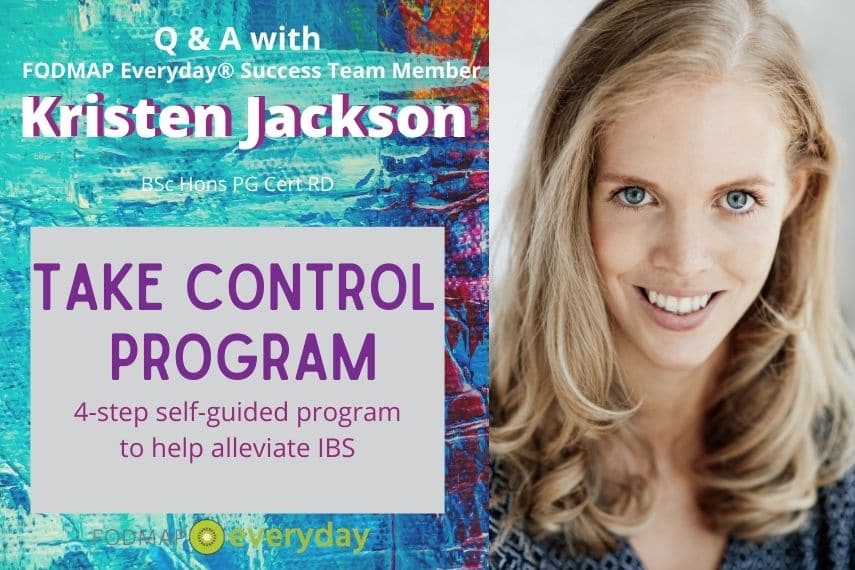Meet Kirsten
Kirsten Jackson is a UK consultant gastroenterology dietitian who lives in Dubai. She started her business, The Food Treatment Clinic, in 2014 and now consults online with people from all over the world.

Kirsten started her career in 2012 after graduating from The University of Hertfordshire in England. She then went on to study a post-graduate certificate in Advanced Dietetics at The University of Nottingham and Advanced FODMAP Training from Kings College University in London.
Kirsten first became interested in gut health after suffering with both IBS and coeliac disease herself. With this she used her own personal experience, coupled with proven science to design the Take Control method which she now teaches to people on both a 1:1 and group basis.
Professional Bio
- Pre and Postnatal Nutrition – Future Fit – Level 3 endorsed by Afn – 2019
- Putting Fibre Back On A Pedestal By Professor Chris Seal – Nestle – CPD Endorsed by BDA and Afn – 2019
- Advanced Dietetics (including Allergy) – Post Graduate Degree Certificate – Nottingham University – 2018
- Introduction To Parenteral Nutrition – The British Dietetic Association – 2018
- The Management of Pancreatic Enzyme Insufficiency – Mylan – 2018
- Diets for diagnosis and management across the spectrum of IgE & Non-IgE mediated food allergies – BDA Freelance Group – 2018
- Probiotics In Practise – Study Day – Yakult & BDA – 2017
- Low FODMAP Trained – Kings College University London – 2016.
- Advanced Media Trained – The British Dietetic Association – 2015.
- Chronic Kidney Disease Stages 1-3 –The British Dietetic Association – 2015.
- Liver Disease Trained – The British Dietetic Association – 2014.
- Total Parenteral Nutrition Trained – The British Dietetic Association – 2014.
- Clinical Supervision Course – The University of Chester – 2013.
- BSc Hons Degree in Dietetics – The University of Hertfordshire – 2012.
Registrations
- Full Member of The British Dietetic Association – 2012 – present.
- Full Member of The Freelance Dietitian Group – 2015 – present.
- HCPC Registered Dietitian (DT26581) – 2012 – present.
Experience
- Lead Dietitian at Kings College Hospital Dubai – September 2018 – Present.
- Specialist Board Advisor for The IBS Network – January 2017 – Present.
- Media Spokesperson for The British Dietetic Experience – 2015 – Present.
- Managing Director of The Food Treatment Clinic – 2015 – Present.
- Specialist Dietitian – NHS – working in surgical gastroenterology, gastroenterology, pancreatic cancer, enteral tube feeding, total parenteral nutrition, refractory coeliac disease, coeliac disease, IBS, IBD, gastro-esophageal reflux disorder, general oncology, stroke, diverticular disease, pancreatitis, liver disease, mental health, alcohol-detox and eating disorders – 2012 – 2017.
Contact
Follow Kirsten


Always have a plan for you next two meals. To be successful on the low FODMAP diet you need to practice meal planning. A low FODMAP meal can take a little extra work and recipe adaptations which are less likely to occur if you feel rushed or unprepared.
For example, it is 8am and you just finished breakfast, start thinking about what you will have for both lunch and dinner. Do you need to pack a lunch, will you be at home, or will you be dining out? Do you need to defrost a protein such as chicken or shrimp for dinner? Any last minute grocery ingredients?
Now let’s say you just finished dinner, can you start thinking tomorrow’s breakfast and lunch? One of my favorite breakfast options is overnight oats. To save time you can pack dinner leftovers for lunch tomorrow Planning a week’s worth of meal plan can be daunting for many. My best is advice is to just think of your next two meals.

I love hummus and unfortunately most store bought hummus contains too many high FODMAP ingredients. My favorite recipe is this low FODMAP hummus. Hummus packs a nutritional punch with fiber, protein, and healthy fats all while tasting delicious. My favorite ways to enjoy hummus is as a dip for raw vegetables such as carrots, jicama, bell peppers, and cucumbers. This is also one of my favorite spreads for sandwiches made with either a low FODMAP bread, coconut wrap, or lettuce wrap.



